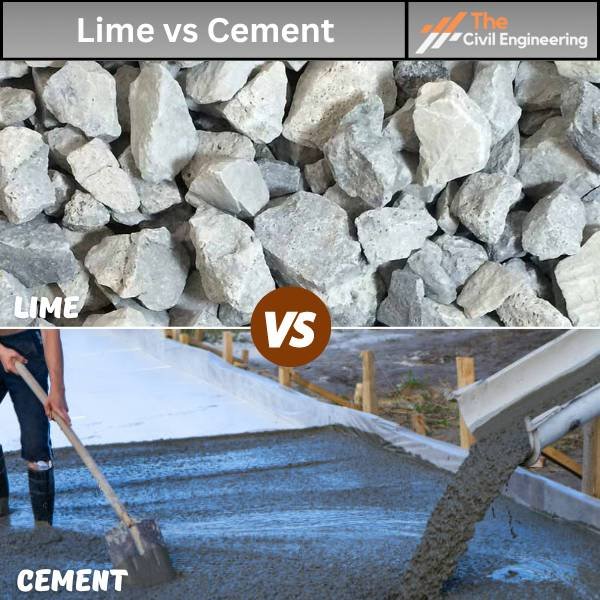Before knowing the difference between Lime and Cement; we have to know about lime and cement.
1. Lime
Lime is a calcium product that is composed of calcium oxide or calcium hydroxide.
It is the civil engineering material that is used for binding two or more mineral materials.
It has many qualities like compressive strength, workability, setting time, etc. So, it is mostly used as an alternative to cement.
Lime is mostly used for the preparation of lime concrete, lime mortar and sometimes used as lime ghola (a mixture of lime + water).
2. Cement
Cement is the binding material that is composed of calcium, silicon, aluminium, iron and many other materials.
It is mostly used as a binding material throughout the world because of its qualities like high compressive strength, setting time, etc.
Cementis mostly used in the preparation of cement mortar, cement concrete and cement ghola (a mixture of cement + water)

3. Difference Between Lime and Cement
The difference between lime and cement is:
| S.N. | Lime | Cement |
| 1 | It is less prone to cracking. | It is more prone to cracking. |
| 2 | It is less brittle. | It is more brittle. |
| 3 | It is white or greyish in colour. | It is greenish-grey in colour. |
| 4 | It slakes when wetted with water. | It does not slake when wetted with water. |
| 5 | It sets slowly when mixed with water. | It sets rapidly when mixed with water. |
| 6 | It delays the construction. | No delay in construction as compared to lime. |
| 7 | It possesses less strength. | It possesses high strength. |
| 8 | It allows vapour to pass through. | It does not allow vapour to escape. |
| 9 | It helps to reduce moisture and improve the environment of the home. | It can absorb water causing moisture to accumulate especially in the basement. |
| 10 | Its production does not cause global warming like cement. | Its production greatly leads to global warming. |
| 11 | It has less embodied energy than cement. | It has embodied energy. |
| 12 | It is possible to manufacture lime on a small scale. | It is impossible to manufacture cement on a small scale. |
| 13 | Its binding strength is less compared to cement. | It has strong binding properties than lime. |
| 14 | Lime hardens slowly when mixed in producing mortar. | The cement hardens quickly when mixed in a mortar. |
| 15 | It cannot be used for important and heavy engineering structures. | It can be used for important and heavy engineering structures. |
| 16 | It is cheaper. | It is expensive. |
| 17. | It is more flexible. | It is less flexible. |
| 18. | Carbon footprint is low | Carbon footprint is high |
| 20. | It provides better resistance to acids. | It provides less resistance to acids. |
| 21. | It is more workable in the context of workability. | It is less workable in the context of workability. |
| 22. | It provides a more smooth finish. | It provides a less smooth finish. |
| Read More: 6 Difference Between Tender and Quotation
|
4. Conclusion
In terms of cost and environment, lime is best. It doesn’t lead to the production of harmful gases and contributes to controlling global warming.
It is also possible to produce lime in small quantities. Hence, it is also economical to produce.
In terms of strength, durability, and other qualities, cement is best because it poses high strength and good binding.
In terms of performance characteristics, lime provides advantages in the context of flexibility, thermal insulation, and also resistance to expansion and contraction. Cement is mostly used as a binder in concrete. And also it has the ability to resist water.
In the context of cracking, lime is less prone to cracking, and cement is more prone to cracking.
